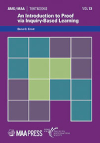- About MAA
- Membership
- MAA Publications
- Periodicals
- Blogs
- MAA Book Series
- MAA Press (an imprint of the AMS)
- MAA Notes
- MAA Reviews
- Mathematical Communication
- Information for Libraries
- Author Resources
- Advertise with MAA
- Meetings
- Competitions
- Programs
- Communities
- MAA Sections
- SIGMAA
- MAA Connect
- Students
- MAA Awards
- Awards Booklets
- Writing Awards
- Teaching Awards
- Service Awards
- Research Awards
- Lecture Awards
- Putnam Competition Individual and Team Winners
- D. E. Shaw Group AMC 8 Awards & Certificates
- Maryam Mirzakhani AMC 10 A Awards & Certificates
- Two Sigma AMC 10 B Awards & Certificates
- Jane Street AMC 12 A Awards & Certificates
- Akamai AMC 12 B Awards & Certificates
- High School Teachers
- News
You are here
An Introduction to Proof via Inquiry-Based Learning

Buy Now:
Publisher:
AMS
Publication Date:
2022
Number of Pages:
169
Format:
Paperback
Series:
AMS/MAA Textbooks
Price:
30.00
ISBN:
978-1-4704-6333-5
Category:
Textbook
[Reviewed by , on ]
Frederic Morneau-Guérin
02/19/2023
The purpose of the book An Introduction to Proof via Inquiry-Based Learning is to present to the reader the process of crafting and writing formal and rigorous mathematical proofs. This work was designed to be used as a reference book for a half-year introductory course to mathematical proofs that students registered in an undergraduate program with a major or minor in mathematics are generally required to take relatively early in their academic career.
The first chapter, in which the author provides a declaration of intent and a summary introduction to the educational philosophy that underpins the book, is followed by eight short chapters dealing with propositional and quantificational logic; basic notions of set theory; the principle of mathematical induction; the real numbers from an algebraic, analytical and then topological perspectives; some notions of elementary number theory; relationships, partitions and functions; and lastly, cardinality.
Throughout the book, the author is stingy with explanations. Usually, definitions are not followed by examples or counterexamples as is generally the case in a book of this type. It is in fact expected that readers will internalize the new concepts themselves. The chapters can therefore be summarized as a sequence of definitions, problems, and statements of theorems (for example, De Morgan’s generalized laws, triangular inequality, the irrationality of √2, the uncountability of the set of real numbers) that the reader will then be called on to try and demonstrate completely self-sufficiently. That said, the book cannot be faulted for lacking structure, as the material (i.e., problems and statements to be proved) is presented in a coherent and logical order.
The author, Dana C. Ernst, an Associate Professor in the Department of Mathematics and Statistics at Northern Arizona University in Flagstaff, acknowledges (even in the title of his book) to be a proponent of an educational philosophy called Inquiry-Based Learning. According to the precepts of this student-centered teaching method, learners are assigned tasks that lead them to resolve problems, conjecture, experiment, explore, create, and communicate.
“You could view this book as a mountaineering guidebook,” the author informs us, noting that he has provided “a list of mountains to summit, sometimes indicating which trailhead to start at or which trail to follow” (p. 4). Ernst admits that there “will always be multiple routes to top, some more challenging than others. Some summits you will attain quickly and easily, while others might require a multi-day expedition. Oftentimes, your journey will be laced with false summits. Some summits will be obscured by clouds. Sometimes you will have to wait out a storm, perhaps turning around and attempting another route, or even attempting to summit on a different day after the weather has cleared” (p. 4). While it is reasonable to expect that talented, well-prepared, and highly motivated students will be able to get through the material in a timely manner, it is likely that an instructor using this book in her or his teaching practice will have to deploy scaffolding strategies to help students overcome some of the difficulties that might compromise their learning or sap their determination and perseverance.
Incidentally and somewhat ironically, the passages in this book that stand out the most due to their quality and originality are those – for example in Appendix A – where the author seeks to (very explicitly!) transmit some of the mores, attitudes, and conventions that are specific to practice of mathematics and proof writing.
Lastly, around 50 quotations from scientists, academics and activists are scattered here and there and artificially inject some excitement into a work of less than 170 pages that is otherwise unremarkable.
Frederic Morneau-Guérin is a professor in the Department of Education at Université TELUQ. He holds a Ph.D. in abstract harmonic analysis.
See the publisher's website.
- Log in to post comments




